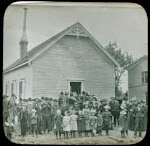Thanks in part to two very kind and helpful interested parties, we're making progress with two chapters on Russell's early years.
We're still trying to trace down the origins of the name "Old Quaker Shop." Someone (and I've very thankful for their help) sent me a bit from the Pittsburgh Press of June 15, 1967, where this claim is made: "Mr. Russell's business was known as 'the Old Quaker Store,' from the picture signboard, of a type often used here and elsewhere when many people were unable to read."
This sounds reasonable. I would like contemporary documentation. The closest we have gotten to contemporary is the 1919 Convention Report. I'd be much happier with something published while Russell was still alive.
I desperately need the November 1, 1877, Herald of the Morning. We never located this issue when researching the Barbour book, but it wasn't as big an issue for that book as it will be for our work in progress, which will detail more closely Russell and Barbour's association and separation. Anyone know where we can find this?
I'm very interested in Russell's presentation of his childhood. We think it refelects his view of his ministry. When we document it, we will present it that way. By 1881 Russell saw himself as God's instrument. The development of his personal view of self can be told only partially in our next book. We stop with 1887 or so. Most of that story will be in book three, if I live long enough to complete that one. If not, someone else can tell it.
I see this as becoming progressively more difficult. The resources required are harder to find and will continue to become difficult. There are also growing issues of interpretation. One should, I believe, put everyone's motive in the best light unless there is reason not to. We have some close calls to make in this new book. There are so many conflicting emotions displayed. Some of the statements by the principals must be read over and over to understand them. Some people are just obvious. I wish they all were.
The most obvious is Albert Delmont Jones who was vain, a thief, and responsible for another's suicide. Jones was a villain pure and simple, a modern day Judas. But Jones is also a complex man. (Aren't we all? - complex I mean.)
At a certain point every historian must make decisions on how to portray those whose life he chronicles. Our preference has been to let them speak for themselves; so we tend to use quotations more than most historians would. If anyone comes off well, it should be based on what they really said and did. The inverse is true too.
Another issues is that some with a partisan spirit wish to see some of the principals as nearly perfect. Partisan spirit arrays itself on various sides. Alas, no human approaches perfection. If you idolize a man, you will be disappointed. Without exception, none of those involved in the Watch Tower movement in the period we now consider were flawless. All were flawed in some way. That's how people are. That's how they were.
We're not writing a eulogy. We're writing history. Expect us to tell an accurate story, even if it makes someone you admire appear less than attractive in one or two circumstances. That's a general statement, and it covers all those involved. At least human faults make for interesting history.
It pleases me to see that the two ratings given to our book are both the highest possible. Thanks to whoever rated our book!
THE STORY IS IN THE DETAILS - Notice: I've withdrawn my books from Amazon. They are now only available at Lulu.com
Please visit our newest posts. We'd love to see your feedback. Copyright Secured. Contact blog owner for permission to use anything you find here.



4 comments:
A couple of oddments on CTR's childhood from his own pen.
A longish description of his being "consecrated to the Lord" by his mother - Pastor Russell's Convention Report Sermons "Children's Consecration Service" - page 154.
CTR's remembering when he was whipped by his mother when aged about 5 - quote "Charles, I do not want you to have your portion with those in the lake of fire and brimstone" - What Pastor Russell Said - question on Children - Training in the Way They Should Go - page 54. (In context, I would imagine that corporal punishment was pretty standard in American homes in the 19th and earlier part of the 20th century).
"Old Quaker Shop" - I wasn't aware that there were many Quakers in Pittsburgh. However, I remember reading somewhere that CTR made regular trips to Philadelphia, where there were Quakers, for merchandise. The train would have gone from Pittsburgh to Philadelphia, and CTR being young at the time could have handled the trip easier than his father. CTR could have stayed overnight or several days, giving him opportunity to visit Adventists in Philadelphia.
"J L Russell and Son" appears in the World's Crisis or Advent Christian Times. According to my recollection the store was called "Men's Furnishing Goods."
More on Philadelphia - Russell had a store at the exposition in 1876 in Philadelphia, was likely there several months, met Barbour there.
He says in the Watch Tower that he remembered hearing Peyton Bowman preach, an Adventist, in Philadephia. This possibly occurred in 1876, but possibly before that. Bowman had connections also with Restitutionist Adventists.
Can we document that Russell had a store at the Centennial Exibition?
Post a Comment